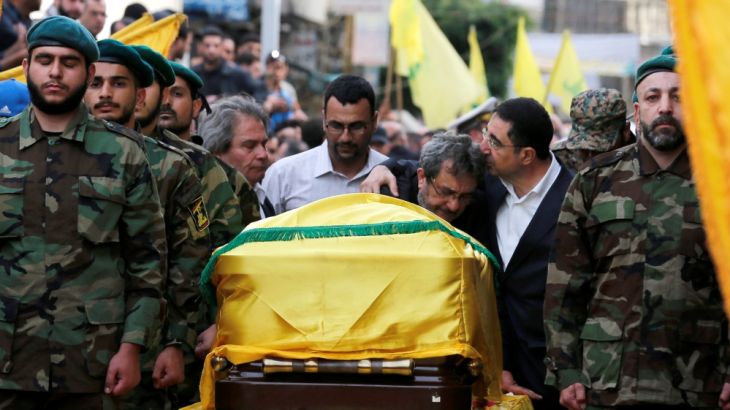Thousands mourn Hezbollah’s Mustafa Badreddine
Hezbollah commander, who was killed in Syria, buried in southern Beirut, as supporters call for revenge for his death.

Thousands of people in the Lebanese capital, Beirut, have attended the funeral of top Hezbollah commander Mustafa Badreddine, who was killed in Syria.
Badreddine died in Damascus this week, the Lebanese Shia group announced on Friday.
Keep reading
list of 4 itemsHezbollah fires dozens of rockets into northern Israel
Hezbollah commander killed in Israeli drone strike in Lebanon
Mapping Israel-Lebanon cross-border attacks
Badreddine’s coffin, draped with a yellow Hezbollah flag, was carried through the streets of a suburb in southern Beirut, as thousands of supporters called for revenge for his death.
Badreddine, 55, was one of the highest ranking officials in the group, and believed by the US government to be responsible for Hezbollah’s military operations in Syria, where thousands of its members are fighting alongside Syrian President Bashar al-Assad.
“[Badreddine] took part in most of the operations of the Islamic resistance since 1982,” Hezbollah said in a statement, announcing his death and describing him as a “great jihadi leader”.
![Mustafa Badreddine was buried in Beirut after a funeral procession in a southern suburb of the Lebanese capital [AP]](/wp-content/uploads/2016/05/8f8816e2ef3143f6be385205ad4f30e2_18.jpeg)
He was killed on Tuesday night, the statement said, adding that the attack targeted one of Hezbollah’s bases near Damascus airport, the group’s nerve-centre in the Syrian capital.
READ MORE: Israel – Any war with Hezbollah will be devastating
The group said it was working to “define the nature of the explosion and its cause, and whether it was the result of an air strike, or missile [attack] or artillery”.
Successor to Mughniyah
Mustafa Badreddine replaced his brother-in-law Imad Mughniyah after he was killed in a car bombing in Damascus in 2008.
Israel officially denied being behind Mughniyah’s killing, but Israeli media reported at the time that the Hezbollah commander had been a target of Israeli assassination attempts since the 1990s.
Accounts cited by the Jerusalem Post newspaper said that Mughniyah was assassinated by Israeli intelligence agents in revenge for the 2006 Lebanon War.
Earlier on Friday, the Lebanese TV station Al Mayadeen reported that Badreddine had also been killed in an Israeli attack.
|
|
However, there was no immediate response from Israel, which has attacked Hezbollah targets in Syria several times during the country’s five-year conflict.
“We decline to comment,” an Israeli military spokeswoman said.
Al Jazeera’s Zeina Khodr, reporting from Beirut, said Badreddine was the highest-ranking Hezbollah commander to have been killed in Syria since the conflict began.
“Some Hezbollah sources are saying that when Imad Mughniyah was killed, he was not replaced by just one man, Badreddine, but rather by several men. Nonetheless, Badreddine was a very high-ranking figure in the organisation.
“Hezbollah has suffered heavy losses in Syria, with some sources estimating that at least 1,200 fighters have died since the group started its involvement in the war. The group is weakened and some in Lebanon are wondering what Hezbollah’s exit strategy is.
“Hezbollah’s military intervention in Syria caused a divide in Lebanon. Some say it was totally wrong as it exposed Lebanon to threats. However, Hezbollah sees this as an existential decision because the Syrian government provides a lifeline to the group.”
‘A significant blow’
Badreddine was indicted by the United Nations-backed Special Tribunal for Lebanon over the 2005 killing of a former prime minister, Rafik al-Hariri, and was also sanctioned by the United States.
READ MORE: Killing Imad Mughniyeh made him a legend
He was sentenced to death in Kuwait for his role in bomb attacks there in 1983. He escaped from prison in Kuwait after Iraq, under the leadership of Saddam Hussein, invaded the country in 1990.
Mathew Levitt, a senior fellow at the Washington Institute and the author of Hezbollah: The Global Footprint of Lebanon’s Party of God, told Al Jazeera that Badreddine’s killing would hurt the group.
“This is a pretty significant blow to Hezbollah … He was extremely close to the Secretary General of Hezbollah Hassan Nasrallah,” Levitt said.
|
|